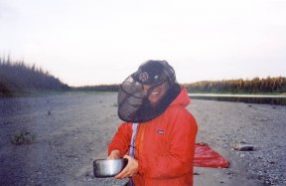News Detective: Swatting Swarms
Emily, Science News for Student’s intrepid reporter, swats mosquitoes.
I’d never seen anything like it. And believe me, I’ve seen my share of mosquitoes.
Every summer, I spend a lot of time outdoors. I’ve even trekked for 6 weeks in the Amazon rainforest in Peru. There were so many kinds of biting bugs in the jungle that I couldn’t even name them all.
Biting insects love me more than I deserve, and I react to them in the worst possible way—with huge welts that itch like crazy and never seem to go away. In the rainforest, I scratched myself to sleep every night and scratched myself awake every morning.
 |
| Emily wears a head net to ward off mosquitoes and other biting insects. |
| Gabe Keller |
So, I was a little nervous before my most recent adventure. I was to go on a 2-week whitewater canoe trip up the Missinaibi River in northern Ontario.
This part of Canada is famous for its insect populations. The riverbanks are soggy mops of swampland, called muskeg, where mosquitoes thrive. This spring also happened to be particularly wet and cold. In other words, these were the perfect breeding conditions for the spindly insects. We’d be camping right next to muskeg the whole way. There’d be no escape.
It turned out worse than I could imagine—at least as far as biting insects are concerned. From the first day of the trip, anytime we were on land near grass and trees, we were nothing but fresh meat for swarms of mosquitoes.
And I mean swarms. During the first 3 days, we had to carry the canoe along some portage trails. Every time we sat on a log in the forest to rest for even just a few minutes, we swatted endlessly. It seemed impossible that there could be so many of the bloodthirsty critters. My companion, Gabe, tried to count how many he killed. After a minute or two, he lost count in the hundreds.
We wore lots of clothes as protection. We slathered DEET all over ourselves. We also wore head nets, which were real lifesavers. Still, the mosquitoes bit us through our rain jackets and fleeces. After all, the bugs up there areused to biting through thick and tough moose hide.
Attracted by our heat and carbon dioxide, the insects buzzed hungrily all night long in the space between the tent and the tent fly, just waiting for us to have to go to the bathroom. We started drinking less water to avoid that fate.
After a while, we got better at dealing with the mosquitoes (and the black flies and the gnats and the big biting horseflies). The bugs didn’t bother us when we were in the canoe, so we started doing as much packing as we could while in the tent, then bolting for the boat to eat breakfast, put on sunscreen, even brush our teeth.
Eventually, we started finding wide-open beaches with breezes, and we built a few fires, all of which made a huge difference.
Now, a week later, most of my bites have healed. Great memories about the scenery and the rapids are quickly replacing the bad memories about the bugs. A year from now, I’ll probably forget about the mosquitoes completely.
Don’t ask me to study the little vampires, though. I’ll leave that to the experts.—E. Sohn